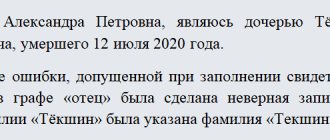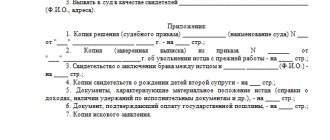Home / Family law / Inheritance
Back
Published: 08/05/2018
Reading time: 9 min
0
1278
Often, issues of inheritance distribution become the subject of lengthy legal proceedings. You can challenge an inheritance both in terms of inheriting property according to the law and according to a will. In the latter case, the heirs must acquire compelling reasons for revoking the will or declaring it partially invalid.
- How to challenge an inheritance legally?
- What are the legal deadlines for challenging a will?
- Who has the right to challenge the last will of the deceased?
- Grounds for challenge
- Procedure
- Is it possible to challenge a will for an apartment and who can do this?
The will was made by an incapacitated person or a person who did not understand what he was doing
In order to make a will, a person must have full legal capacity. This means that testators cannot be minor citizens, as well as citizens recognized by the court as incompetent or limited in legal capacity.
Making a will for minors is an extraordinary situation, but one that can be easily resolved. If you are not eighteen years old according to your passport, the will is invalid.
But incapacity and restrictions on legal capacity must be established by the court during the life of the testator, before drawing up a will. Even if a notary has certified the will of a person in respect of whom one of these decisions was made, the will will also simply be declared invalid.
The situation is more complicated when a person was not recognized as incompetent or partially capable either before or after the will was executed. However, she did not have the opportunity to understand the meaning of her actions or manage them.
In practice, it is believed that such a condition must be caused by a disease. This means that if you want to declare in court that your grandfather did not understand anything when he signed the will, you will not be able to do without a posthumous psychiatric examination. And she, in turn, will give an answer only if the grandfather was observed in the hospital and had the appropriate diagnosis.
In other words, it makes no sense to simply refer to the fact that the testator was too old or the testator consumed too much alcohol. (And I also wrote about this in another article - dedicated to challenging transactions under Article 177 of the Civil Code of the Russian Federation).
At the same time, it should be noted that wills are most often contested precisely on this basis. And this implies additional costs for plaintiffs to conduct an examination, as well as prolongation of the legal dispute over time.
If you are planning to challenge the will or if a lawsuit is filed against you, write to or call + 7 499 390 76 96. I, lawyer Vladimir Chikin, will help you resolve your situation.
Who can challenge a will on a house?
According to Article 1131 of the Civil Code of the Russian Federation, the circle of persons who have the right to apply to court to challenge a will is clearly limited. These include persons directly interested in invalidating the document, that is, the legal heirs of the line that would be called to inherit in the absence of a will. First of all, such persons are the widower or widow of the testator, his parents, children (if the children have already died, then the grandchildren - by right of representation). If none of the listed persons is present, the right passes to representatives of the second, third order, and so on.
It was already mentioned above that in addition to the persons expressly provided for in the will, other persons may also lay claim to the inheritance. We are talking about a mandatory share due to minor children, disabled parents, widower/widow, and dependents whom the testator, for one reason or another, did not indicate in the will.
To receive the obligatory part, these heirs do not need to challenge the will - it is enough to present to the notary's office documents confirming social status and family ties with the testator, which ensures the right to a share in the house.
The will was signed by another person
It should be noted that the law allows the will to be signed by another person (the executor). However, this becomes possible only when, due to physical disabilities or illiteracy, the testator is unable to sign the will himself. If, after the death of the testator, it is revealed that there were no grounds for involving the assaulter, the will will be declared invalid.
Sometimes criminals resort to direct forgery and forge a will, signing for the testator. In this case, it is necessary to conduct a handwriting examination and investigate the circumstances of the execution of the will with a specific notary. Of course, revealing facts of forgery will entail invalidation of the will.
Finally, one more scenario. The testator submits a closed will to the notary. (In these cases, the will is not written in front of the notary and is not shown to him). But another person wrote it. If the examination can confirm this, the will will be successfully challenged.
Grounds for litigation
The law establishes strict requirements for the procedure for registering a will. Failure to comply with one or more conditions entails the invalidity of the document.
Basic requirements for a will
| No. | Requirement | A comment |
| 1 | Written form | The document does not have to be executed personally. The notary can provide a printed form. However, the document must be in writing. |
| 2 | Notarization | The law establishes a notarial form for a will. A number of exceptions are fixed by law. |
| 3 | Certification by a person replacing a notary | Head doctors of hospitals, commanders of military units, heads of institutions of the Main Directorate of the Federal Penitentiary Service, heads of expeditions, sea captains and other persons act as authorized persons. |
| 4 | Availability of witnesses | The law provides for the need for witnesses when drawing up a will in emergency conditions, or a closed expression of will. |
| 5 | Availability of personal signature of the owner | The absence of a personal signature is acceptable in cases where a citizen cannot do this on his own. The responsibility for signing the will rests with the executor. |
| 6 | The document must express the will of one citizen or a married couple | A will is a personal document. Since 2021, the law provides for the possibility of formalizing a declaration of will for a married couple who are officially married. |
| 7 | The owner has full legal capacity | When drawing up a document, a citizen must be in a sober state and fully aware of the consequences of his actions. |
| 8 | Requirements for a witness, executor, executor | Persons must be competent, speak the language, and understand what is happening |
| 9 | No pressure on the will of the owner from third parties | A document executed under threat of physical violence is invalid |
| 10 | Availability of signature and date of execution of the document |
Deception, threats and violence
If a will was made under the influence of one of these factors, it may be invalidated. Article 179 of the Civil Code of the Russian Federation should apply.
However, in practice, challenging the last will of the deceased under these circumstances turns out to be very problematic. This is explained by the fact that the testator can no longer reliably tell whether the will was drawn up because, for example, someone threatened him.
However, in each specific case it is necessary to consider the possibility of applying, among other things, the specified norm.
Consequences of invalidating a will
Recognizing an order as invalid gives rise to certain legal consequences. One of them is the removal of the applicant from the inheritance.
The procedure for receiving an inheritance depends on the number of wills that the deceased citizen made. If the invalid order was not the only one, then the inheritance will be distributed on the basis of the previous version of the document. Consequently, the persons specified in the canceled or amended will are called upon to inherit.
If the administrative document was the only one, then close relatives of the testator enter into inheritance rights. This includes children, parents, living spouse (Article 1142 of the Civil Code of the Russian Federation).
In the event of the death of one of the primary heirs, the property is accepted by his children, i.e., the grandchildren of the testator.
Invalid provisions of a will
Let's say the will is drawn up in accordance with all the rules of procedure, signed by a testator of sound mind and notarized. However, all or some of its provisions may be contrary to the law. And this is also a basis for declaring the will invalid. In whole or in part.
For example, it is impossible to provide for the creation of an inheritance fund in a closed will. You cannot ask the heirs to commit an immoral act in exchange for receiving an inheritance. You cannot bequeath property to a child who will be conceived after the death of the testator using his biological material. It is impossible to transfer inherited property to a person under the condition that he bequeaths it to another person specified in this will.
Such “impossibles” can be imagined in greater numbers. To what extent the will complies with the requirements of the law, you need to understand each specific situation.
Litigants
The law does not limit the list of plaintiffs in cases of invalidation of a will. Any individual or legal entity can apply to the court. The only condition is that the plaintiff must be directly related to the subject of the dispute. Otherwise, the court will refuse to accept the statement of claim (Article 134 of the Code of Civil Procedure of the Russian Federation).
Thus, the following may act as a plaintiff :
- heirs at law;
- applicants who were indicated in the previous order;
- representatives of government bodies (in relation to property that may be recognized as escheat).
The defendant is a person who has the right to inherit . As a rule, this is the heir under the will.
A notary is hired as a third party to handle the inheritance case.
The cost of a lawyer challenging wills in court
Drawing up a statement of claim, collecting documentation on the case From 5,000 Representation of clients' interests in the first court instance From 40,000 Representation of the client's interests in the appellate instance From 45,000 Work of a human rights defender in the cassation instance From 50,000 Drawing up petitions for the trial From 2,000 Drawing up procedural complaints From 4,000 Appeal of individual positions in a document From 40,000 Recognition of an heir as unworthy From 45,000 Cancellation of registration records regarding property From 5,000 Support of enforcement proceedings From 10,000Will and heirs with obligatory share
Some owners, due to inattention, and sometimes on purpose, deprive the rights to property of their closest relative - spouse, son or daughter, parents. This happens quite often in life.
However, if a relative deprived of an inheritance has not reached the age of majority or is incapacitated (retired, disabled), he is necessarily entitled to a share of the inherited property. In reality, this part is less than desired - only half of the inheritance that he would have received by law. However, this is better than nothing at all.
Thus, minors or adult disabled children of the testator, needy mother/father, surviving spouse receive a part of the property if the right of compulsory share is violated when drawing up a will.
Recognition of the heir as unworthy
It is not always necessary to invalidate a will. Sometimes it is enough to recognize the heir as unworthy. In such circumstances, the notary will exclude him from the inheritance, regardless of the presence of a will. Grounds for declaring an applicant unworthy:
- Attempts to influence the testator in order to increase the share of property in the will or conspiracy with other legal successors to carry out similar actions.
- Evasion from fulfilling obligations assigned to the heir . For example, if there was a court decision on the maintenance of the testator.
- Committing illegal actions against a deceased citizen. For example, regularly beating an elderly parent, killing or driving a person to suicide. The court verdict is indisputable evidence in such cases.
Strategy for challenging a will by a lawyer: algorithm for a specialist’s work
At the initial stage of a specialist’s work, an analysis of a specific process is always carried out. This allows you to determine at a preliminary stage the possibility of appealing the document. Traditionally, the strategy includes several steps:
- Drawing up a statement of claim together with searching for evidence and determining the grounds. The statement of claim must be written correctly, otherwise the case will not be accepted for proceedings;
- Formation of the evidence base. At this stage, the will contesting lawyer interviews witnesses and searches for certificates from medical institutions;
- Assistance in imposing an interim measure. This is necessary to ensure that the property is not sold by other heirs;
- Filing an application to a judicial authority. After submitting the claim with all the necessary additional information and evidence, it goes into production and is considered by the court.
During legal proceedings, a detailed analysis of the legal position of all participants, as well as the situation faced by the person, is carried out. The participation of a lawyer at this stage will be important. The court's decision depends on how effective the work of the human rights defender is.
Limitation period for appealing a will
The legislator has limited the statute of limitations for relatives wishing to appeal the will of the testator.
- To recognize a will as void (the document does not meet the norms of the law), the statute of limitations is 3 years and is calculated from the day when the failed heir learned or could have learned about the violation of his inheritance rights.
- To challenge a will (in the absence of the free will of the testator), the period for appeal is 1 year and is calculated from the day when the fact causing its invalidity is established.
In our previous article we talked about the procedure for inheriting property without a will.
Facebook









